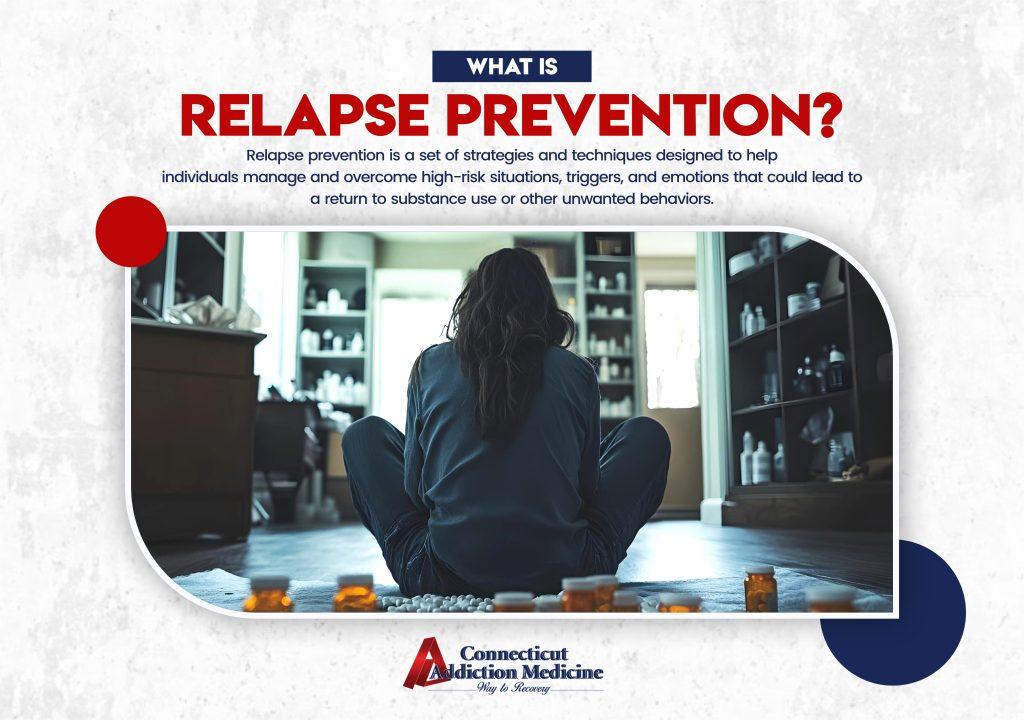It may feel like you failed when you relapse, but you didn’t. In reality, it’s a part of the healing process for many people who are addicted. That’s why understanding relapse prevention is so essential.
Relapse prevention is a plan to avoid returning to substance use.
The main goal of relapse prevention is to stay sober. It means figuring out how you think and making your emotional strength stronger.
For proper care and guidance on medical recovery and long-term success, reach out to CT Addiction Medicine today.
Why Triggers Matter in Relapse Prevention
Triggers are cues that lead to cravings. They can be:
- Emotional
- Environmental (places or people associated with past use)
- Physical (withdrawal symptoms, illness)
How Relapse Prevention Skills Are Taught
Relapse prevention skills are learned through some methods. Some examples include:
- Delay techniques
- Distraction methods
- Coping statements
- Seeking social support
Core Components of an Effective Relapse Prevention Plan
Here’s what a strong prevention plan includes:
-
Trigger identification
Triggers can be:
- Emotional
- Physical
- Environmental
You can avoid the things that make you crave once you know what they are.
-
Coping skills
Some common relapse prevention skills include:
- Taking deep breaths
- Practicing mindfulness
- Talking to a trusted person
-
Support system
This may include:
- Friends or family who understand your journey
- Peers in recovery programs
- Therapists
When you want to give up, the support they provide you might be quite important.
-
Healthy routines
- Regular balanced meals
- Exercising regularly to improve mood
- Making time for hobbies
- A good sleep cycle
These small habits make it easier to resist relapse triggers.
-
Emergency steps
Even with a plan, tough days happen. That’s why having emergency steps in place is vital. These steps act as your safety net. They might include:
- Contacting your therapist
- Leaving a vulnerable environment
- Reviewing your relapse prevention plan
- Connecting with a support group
All these combines to support relapse prevention in daily life.
Comparing Popular Relapse Prevention Approaches
| Approach | Description | Best For |
| CBT | Helps you change the way you think | General substance use |
| Mindfulness-Based Relapse Prevention | Focuses on awareness | Stress & emotional triggers |
| 12-Step Programs | Offers structured peer support | Social connection & guidance |
| Interviewing | Strengthens personal motivation for recovery | Early stages of recovery |
Is Relapse Prevention Therapy Right for You?
Yes.
It often includes:
- Role-playing scenarios
- Thought tracking journals
- Self-monitoring tools
- Group discussions
Relapse Prevention and Mental Health
Addiction rarely occurs alone. A dual diagnosis strategy combines mental health care with relapse prevention. This coordinated care improves outcomes and lowers recurrence.
What If You Do Relapse?
It means something in your plan needs to be adjusted.
Maybe you need:
- More therapy
- A different environment
- Medication adjustments
- New relapse prevention strategies
The Transtheoretical Model in Action
Relapse prevention strategies in the transtheoretical model highlight how change happens in stages.
People often move between:
- Contemplation
- Preparation
- Action
- Maintenance
- Relapse (yes, it’s a recognized stage)
How Families and Loved Ones Can Help
They can:
- Encourage healthy habits
- Avoid being judgmental
- Learn about relapse prevention techniques
- Be there when cravings hit
This reduces isolation, one of the top relapse triggers.
What to Do When Urges Hit
Urges to use can come suddenly. Have a quick action plan ready:
- Try breathing exercises
Call or text someone you trust
- Drink a glass of water
- Leave the place that triggered you
- Remind yourself why you chose recover
Final Words
Recovery is not something that happens overnight. What truly matters is that you don’t stop. Each step forward in your healing journey is a win.
Maybe your triggers have changed. Maybe you need more support.
This is where relapse prevention becomes so important. It’s not just a one-time thing. It’s a living plan that grows with you.
Daily Habits That Support Sobriety:
- Eat healthy meals on time
- Stay away from people who trigger cravings
- Write your thoughts in a journal
- Go for a walk or stretch your body
- Limit time on social media
- End your day with a gratitude list
At CT Addiction Medicine, we understand the challenges of recovery. We know that staying sober is not always easy.
FAQs
Q:How to stop yourself from relapsing while you’re stressed?
Change your attention, use breathing methods, and call a friend for help.
Q:Does therapy to stop relapses really work?
Yes, a lot of people gain from it. It helps you deal with cravings and stay strong.
Q:Can family members help with relapse prevention?
Absolutely!
Q:Can I still recover if I relapse?
Yes. Many people relapse and still recover successfully.
Q:Do I need to avoid all my old friends?
Yes, If they use substances.
Q:Is it normal to feel angry during recovery?
Yes. Emotions are part of healing. Therapy can help manage them.
Q:Can I ever drink or use again in moderation?
For most people in recovery, total abstinence is safest.

